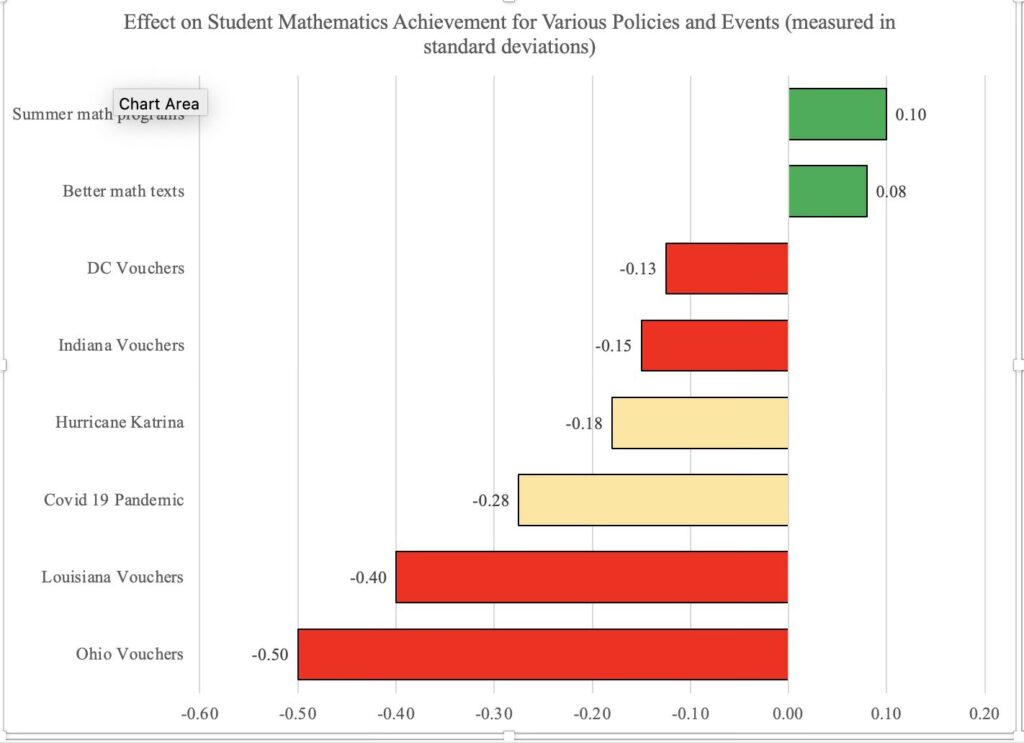What Causes More Learning Loss than the COVID Pandemic?
Today, the 2022 NAEP results (including state and district comparisons for 4th and 8th grade Reading and Math) will be released. NAEP, or the National Assessment of Educational Progress is the largest nationally representative, continuing evaluation of the condition of education in the United States. It is often referred to as “The Nations Report Card.”
Whatever the results, you can expect the Florida Department of Education (FLDOE) and Governor DeSantis will put a political spin on them. Additionally, you can expect Florida to suggest its Covid mandates, requiring all public schools to re-open during the delta surge, prevented the learning losses seen in other states (who kept their school buildings closed longer during the pandemic).
Did I forget to mention that NAEP, itself, cautions against interpreting its results as implying causal relationships? I don’t expect DeSantis or the FLDOE will mention that. Nope, Florida will definitely spin any data to prove that our governor’s education mandates during Covid resulted in better outcomes for Florida’s kids. He probably had a hard time sleeping last night, excitedly hoping that California and New York’s NAEP scores were bad.
[To learn more about the common misuses of NAEP results, read this thread by Andrew Ho. He calls it “misNAEPery”, with number one misuse being “correlation is causation.”]
The COVID pandemic definitely had an impact on student learning. Not surprising, students at high poverty schools suffered the most. Also, no surprise, in-person learning was more effective than remote.
It is quite possible that DeSantis’ COVID policies may have mitigated some of the “learning loss” resulting from remote learning during the pandemic.
Do you you want to know what has been shown to consistently cause WORSE learning loss than COVID?
Vouchers.
Of course, Florida has no intention of reining them back in.
I was recently introduced to the work of Joshua Cowen by an episode of the edu-podcast “Have You Heard” entitled “Moving the Goalposts.” As always, it is worth a listen.
Cowen is a professor of Education Policy at Michigan State University. He also was the founding director and co-director of the Education Policy Innovation Collaborative (EPIC) from 2016 to 2020, where he studied the effectiveness of voucher programs. In his July 2022 op-ed in the Hechinger Report, entitled “After two decades of studying voucher programs, I’m now firmly opposed to them,” he explains why public money should no longer be funding private tuition. The answer: “these programs on balance can severely hinder academic growth — especially for vulnerable kids.” In fact, the losses seen in the Louisiana and Ohio Voucher studies EXCEED the losses seen following Hurricane Katrina and Covid.
Cowen’s Twitter feed (you should follow him, @joshcowenMSU) is full of data, charts and graphs that informed his conclusions – like this one, showing the effect of various policies and events on Student Math Achievement. And you though COVID was bad…

Cowen says he was initially “cautiously optimistic that vouchers could help.” He now says, “In 2022 the evidence is just too stark to justify the use of public money to fund private tuition.”
“There’s also a moral case to be made against voucher programs. They promise low-income families solutions to academic inequality, but what they deliver is often little more than religious indoctrination to go alongside academic outcomes that are worse than before.”
When Cowen compared results of public schools to voucher programs in Milwaukee, post- Katrina Louisiana, Indiana and Ohio, the results were the same: especially for low-income families as well as Black students, vouchers on the whole failed to deliver. And the measurable losses are worse than those seen with the pandemic. Cowen says, “The bottom line is that the research case for vouchers doesn’t hold up to scrutiny, while the research case against them has been flashing warning lights for almost a decade.”
Cowen warns, “Advocates are re-packaging vouchers as a solution to pandemic-related learning loss, while all but insisting that low-income parents ignore the learning loss caused by vouchers themselves.”
So… later today, when you hear DeSantis and the FLDOE blame disappointing NAEP scores on the COVID policies of “lockdown states,” remember that, throughout the pandemic, Florida has continued to expand its voucher programs and DeSantis has promised more of the same during the next legislative session.
If the governor is serious about limiting learning loss, and not merely politicizing it as a campaign strategy, then he should take a serious look at reducing the learning loss associated with voucher participation.
Florida spends more than $2 BILLION annually on publicly funded private school vouchers ($1.3 billion on the Family Empowerment Scholarship, straight out of our local schools’ funding formula, the FEFP, and ~$1 Billion in tax credits for the Florida Tax Credit Scholarship). 63% of those students return to public schools after just 2 years. Gov. DeSantis could use his new FAST progress monitoring data to inform parents of the learning loss that may be happening when they enroll their children in these schools, which currently are not held accountable to any academic standard.
Or… perhaps he is less concerned about learning loss and more interested in advancing his privatization agenda and scoring political points against his partisan foes…

What are these “better math texts”?
Are they among the one DeSantis censored as too woke?